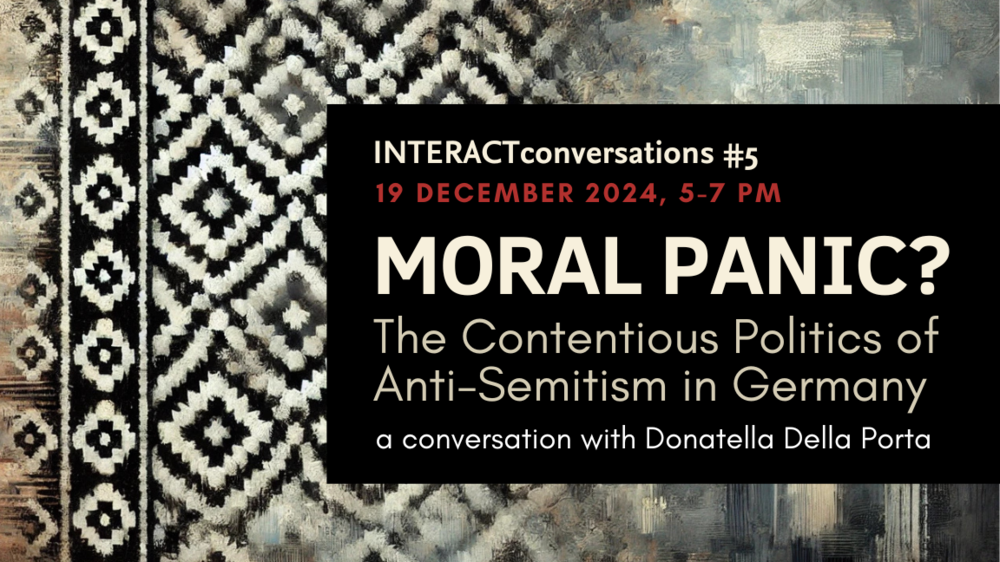INTERACT conversations #5: Moral Panic? The Contentious Politics of Anti-Semitism in Germany. Conversation with Donatella Della Porta
News from Dec 04, 2024
++ REGISTRATION REQUIRED + + SCROLL DOWN FOR REGISTRATION LINK + +
Moral panics can be used as a mechanism of repression of political and social protests through the definition of activists as challenging the core values of a society. Taking Germany as a critical case, Della Porta analyses a number of aggressive campaigns mounted by the media and politicians against progressive artists and intellectuals, most of whom are from the Global South, but which also include Jewish people critical of Israeli actions, who have been accused of violating the German narrative in what has been defined as a “war” against anti-Semitism. After an introduction to the repression of pro-Palestinian protests, Della Porta will begin by providing a methodological note, before going on to present the conceptualization of a moral panic and locate its mechanisms within an analysis of the repression of social movements.
In what follows, some cases are discussed that can be read through the sociological category of a moral panic, singling out the panic entrepreneurs and their forms of intervention as well as the outcomes of their actions. What this analysis adds to the literature is a reflection on the contextual conditions for the development of such moral panic in a specific mass-media, regulatory and political context. Della Porta suggests that in the German case in particular the contextual conditions for the spread of the moral panic are related to: a) a bureaucratization of anti-Semitism policies, with the creation of a specialized bureaucracy; the adoption of a semi-legal definition of anti-Semitism through the development of an especially vague and blurred definition of anti-Semitism; and the assimilation of anti-Zionist peaceful forms of protests (such as BDS) as anti-Semitic; b) the development of political and cultural opportunities around the definition of the security of Israel as a “raison d’État” and a convergence on a selective, formalized official memory; and c) the alignment of the majority of civil society and mass-media around an official narrative.
Prof. Dr. Dr. Donatella della Porta, born on June 3, 1956, in Catania, is a renowned Italian political scientist and sociologist. She is a professor of political science and dean of the Faculty of Political and Social Sciences at the Scuola Normale Superiore in Florence, Italy. There, she also directs the Centre on Social Movement Studies (COSMOS) and the PhD program in Political Science and Sociology. Her research focuses on social movements, political violence, terrorism, corruption, as well as policing and protest policies. She has conducted extensive studies in countries such as Italy, France, Germany, and Spain. Over the course of her career, she has received numerous awards, including the Mattei Dogan Prize for Distinguished Contributions to Political Sociology in 2011. Additionally, she was named an International Honorary Member of the American Academy of Arts and Sciences in 2022. Donatella della Porta is the author or editor of over 100 books and numerous scholarly articles and book chapters.
